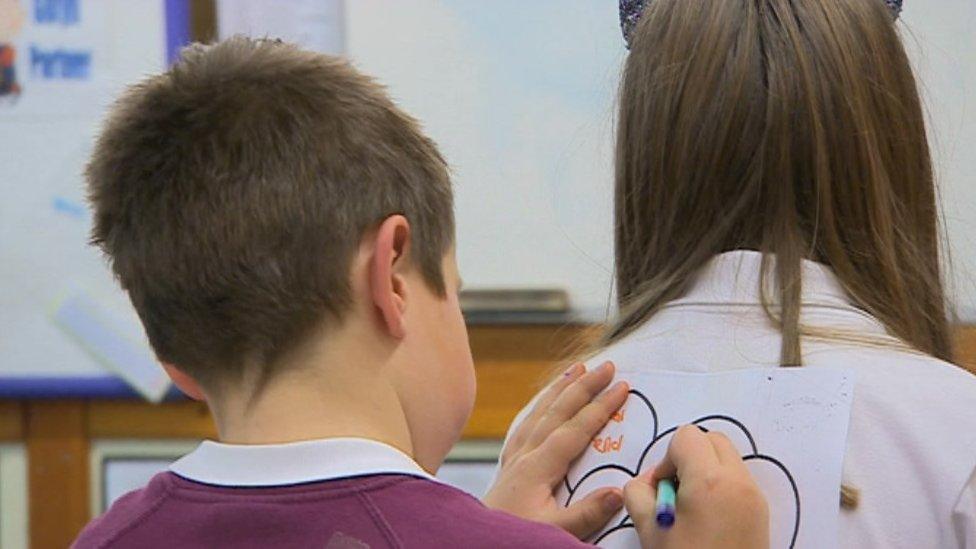One in 10 Wales secondary school pupils 'bullied weekly'
- Published

Rhiw Bechan pupils write positive things about each other as part of the KiVa scheme
Individual school policies on bullying should be replaced by a national strategy, a leading expert has said.
Bangor University's Prof Judy Hutchings said bullying decreased in Finland after this approach was adopted.
One in 10 secondary school pupils in Wales are bullied weekly and 35% have been targeted in the last two months, according to figures from the Schools Health Research Network.
The Welsh Government is reviewing the guidance it provides to schools.
The Children's Commissioner for Wales, Prof Sally Holland, believes statutory recording of incidents would make schools more accountable, but wants to avoid a league table "naming and shaming" schools.
Bangor University researchers have been introducing a programme from Finland called KiVa, with the first 14 schools to take part reporting a 40% reduction in bullying, and 123 more schools registering on the scheme.
The scheme includes a child survey, school activities, lessons, online games, a website and a parents' evening - and focuses on changing bullies and bystanders, rather than changing victims' behaviour.
The pupils read positive things classmates have written about them
Allyson Whitticase, head teacher at Rhiw Bechan in Newtown, Powys, would like to see it rolled out across Wales.
"I feel passionately about mental health in children, we have an awful lot of children who are anxious these days," she said.
"Later in life they will be able to recognise bullying, whether in workplace or in further education, they will have the strategies to know how to deal with that and hopefully that will protect their mental health and wellbeing."
Prof Hutchings said current anti-bullying policies did not change behaviour "because it was a piece of paper in somebody's office" and may not have been developed based on evidence of what works.
The Welsh Government said it wants to see a whole-school, proactive approach - but it is for schools to decide which approach works best.
The Children's Commissioner for Wales, Prof Holland, added: "I don't want parents to be put off sending the children to some schools because they seem to have high levels of bullying.
"If schools are recognising bullying they may end up recording higher levels than schools that aren't and as a parent myself I would be more confident in schools that recognised bullying was going on than one that swept it under the carpet."
She added giving schools inspectorate Estyn a bigger role in monitoring how schools perform in this area could be one answer.
- Published11 November 2016
- Published8 February 2016
- Published10 May 2016